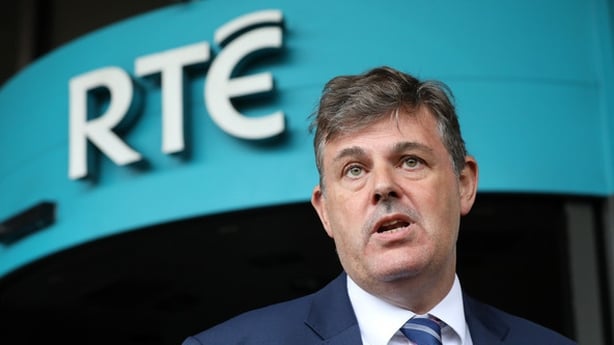Minister for Media Catherine Martin has indicated that RTÉ might require more than €16 million in interim funding in the Budget.
The minister said this figure was under consideration before the recent RTÉ controversy over the publication of inaccurate figures for presenter Ryan Tubridy's earnings.
Ms Martin said she had held discussions with the Government party leaders on the matter.
However, the minister said she would now have to assess the TV licence receipts and RTÉ's commercial revenue, over the next few weeks before deciding on a final figure.
Minister Martin said it was too early to say if there was a trend of fewer people being willing to pay the TV licence or whether it was an initial quick reaction.
There have been concerns about whether RTÉ would suffer a loss of revenue both through fewer people paying their annual €160 TV licence fee and by a drop of advertising clients as a result of the debacle.
The minister confirmed there was a 31% reduction in TV licence fee payments in the second week of July compared with last year.
There were 8,922 sales of TV licences in the second week of July, compared with 12,981 in the same week in 2022.
This follows a 27% decrease in the renewals of TV licences in the first week of the month compared with the same period last year.
Ms Martin said it is "really important" for people to pay for their TV licence, adding it was the "law of the land" and vital for public service broadcasting.
The figures were released by Minister Martin in a reply to a parliamentary question from Fine Gael TD Brendan Griffin.
'Not necessarily a useful indicator'
In a statement, the Department of Media said public service content is vital for a well-functioning democracy and the licence fee supports a broad range of content across various broadcasters and independent producers.
"The TV licence fee sales figures recently released are likely to reflect public sentiment at the height of the RTÉ controversy," the department said.
"This is a point-in time comparison and not necessarily a useful indicator of future trends.
"As such, it is premature to draw any conclusions on the basis of limited data but the department will continue to monitor this situation over the next couple of months.
"A Government decision on the future funding model has been paused until the independent examination of RTÉ is complete. The minister will keep RTÉ's financial position under review."

RTÉ Director General Kevin Bakhurst said he was very grateful to those who have continued to buy a TV licence during a period when events have cast such a dark shadow over RTÉ. He added that they have every right to feel let down.
A total of 5,837 fewer TV licences were issued during June and the first week in July than there was in the same period in 2022.
This equates to revenue of €933,920 and there have been calls on the Government to put a contingency plan in place to address this loss.
Mr Griffin, who sits on the Oireachtas Committee on Media, believes a significant proportion of the population has lost confidence in RTÉ.
Mr Bakhurst said the new leadership team was working hard to rebuild trust in the organisation and will continue to do so.
He also thanked hard-working staff who he said, despite everything, remain focused on producing great programming and content for audiences across television, radio and online.
Ms Martin said her officials would continue to monitor the number of licences issued and the impact on TV licence fee receipts.
The total number of licences issued in June this year was 73,421, while this figure was 75,067 in 2022.
Renewal drop off 'not a surprise'
Minister for Finance Michael McGrath said it was not a surprise that TV licence renewals have dropped off given that RTÉ has been in the eye of a storm.
He said this storm was of RTÉ's own making, but the Government is urging people to continue to pay their TV licence to support ordinary staff who are delivering high quality public service broadcasting.
The minister said the question of Government supports for RTÉ does not arise at the moment.
However, if it were to arise the Government would look to see what reforms RTÉ had implemented.
Labour media spokesperson Senator Marie Sherlock also said that it is not surprising that the number of people paying for their TV licence decreased.
Speaking to RTÉ's News at One, she said: "It’s not surprising but we need to be careful that we don’t over-interpret from one week in the year."
Ms Sherlock said that people warning of a further drop off in the payment of TV licences could become a "self-fulfilling prophecy".
Former minister for communications Richard Bruton said the drop in numbers is worrying.
Speaking on RTÉ's Today with Philip Boucher-Hayes, the Fine Gael TD said the Government may now be forced to face decisions it "had sought to avoid after the Commission on the Future of Media was first published".
Mr Bruton said he and others had favoured a move away from the licence fee in the past, adding that a move to Exchequer funding will have to be re-considered now.
He said that straightforward Exchequer funding might be more palatable for more people.
The issue will be between creating a gap between government funding and the independence of the media, he said, and that is where thought will have to be put into creating that system.
With additional reporting by Laura Whelan and PA






